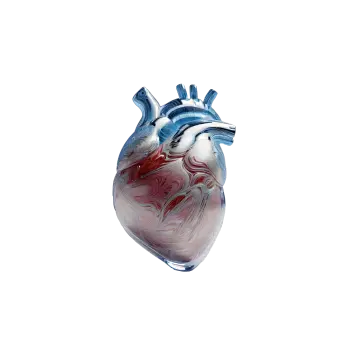The circulatory system – the heart's primary task
The heart consists of four chambers: the left atrium, left ventricle, right atrium, and right ventricle, all interconnected. The atria receive blood, and the ventricles, in turn, pump the blood further.
With an average heart rate of 60 beats per minute, the heart contracts and then pumps about 75 milliliters of fresh, oxygen-rich blood through the arteries and into the body. The blood then returns to the heart. This process is known as the circulatory system, which transports oxygen, nutrients, and hormones. Additionally, the circulatory system ensures the removal of waste products, such as carbon dioxide.
The four heart chambers
The division of the heart chambers consists of two upper chambers called atria and two lower chambers called ventricles. The heart chambers are separated by heart valves, which prevent blood from flowing backward by closing like a door. When a certain pressure level is reached, the valves open, allowing blood to move into the next chamber.
How blood is transported
- The right ventricle receives blood from the body through the right atrium.
- It then pumps the blood to the lungs, where the blood is oxygenated.
- Oxygen-rich blood is then transported to the left side of the heart.
- Here, the blood is pumped out to the body's organs and tissues to provide oxygen and nutrients.
On the outside of the heart, coronary arteries supply the heart muscle with oxygen and nutrients between heartbeats.
5 facts about the heart
- 300-350 grams: That's roughly how much a healthy heart weighs in an adult human's body. This is a relatively small weight considering the crucial role the heart plays in our survival.
- 5 liters per minute: The heart pumps approximately five liters of blood per minute to all of the body's organs and tissues at rest. In extreme cases, such as in elite athletes, the heart can pump 25-30 liters per minute during intense exertion.
- 30 million times a year: That's how many times the heart beats in a year. Over an average lifetime, which is about 83 years in Sweden, the heart beats 2.5 billion times.
- 4 interconnected heart chambers: The heart is divided into two distinct halves, each with an atrium and a ventricle that work together to pump blood throughout the body and maintain our well-being.
- 1 electrical system: The conduction system is an electrical system in the heart that controls the heart's contractions and ensures a regular heartbeat.
How the pulse is generated
Every time the heart beats, it generates a pressure wave through the body, resulting in the rhythmic pulse as new blood is pumped out. The pulse can be felt in various parts of the body, such as the wrist, neck, or groin, where the blood vessels are closer to the surface, making the pulse more measurable.
Blood pressure varies during the cardiac cycle
Blood Pressure is a crucial parameter measured in the arteries and varies during the cardiac cycle. The systolic blood pressure is the highest pressure, measured when the heart contracts and pumps blood into the body. The diastolic blood pressure is the lower pressure, measured when the heart rests between contractions.
Take care of your cardiovascular health
The heart is an amazing muscle that we cannot control with our will. It pumps blood through our bodies and keeps us alive. Therefore, it is important to keep your heart healthy by living a healthy lifestyle and taking care of your overall health, thus reducing the risk of cardiovascular diseases.
By regularly monitoring your values, you can gain insight into your cardiovascular health and whether you may need to make any adjustments to your lifestyle. Our Heart and vascular test that tests essential heart and vascular markers, including cholesterol and apolipoproteins, can provide you with the tools to optimize your health.























